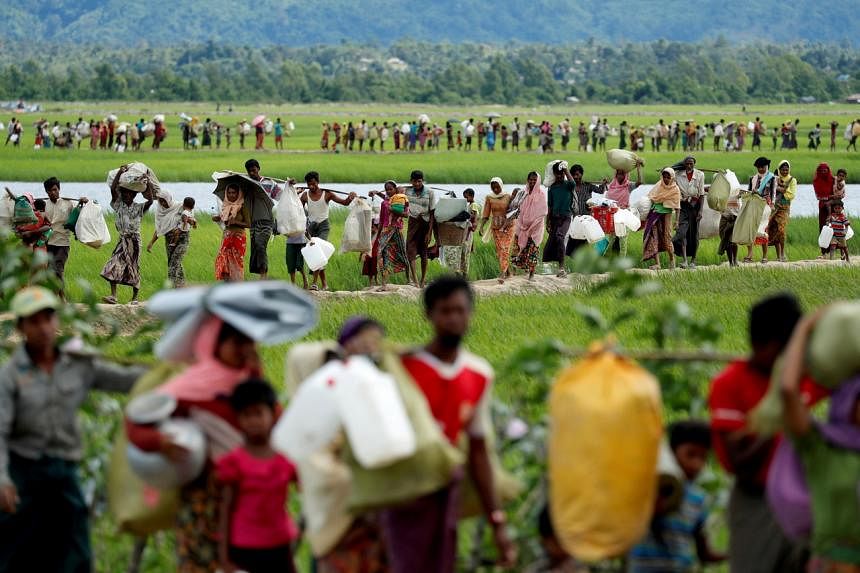DHAKA (THE DAILY STAR/ASIA NEWS NETWORK) - As if a million Rohingya refugees are not enough, we have to now face the prospect of Rohingyas sneaking in through the borders from India into Bangladesh.
Not in too many places has one seen a country not only accept such a large number of persecuted, internationally displaced people, but also shelter them for years on end. The second tranche of them will have been here five years come August. And their numbers inside the camps are increasing.
The report on the matter, carried in this daily on May 22, reveals two very disturbing facts. One, that we are paying for our hospitality-so much so that the conditions in the Rohingya refugee camps in Cox's Bazar are working as a pull factor for the Rohingyas presently sheltered in India. The Rohingyas in India are suffering on two counts.
Firstly, the conditions in the refugee camps locally are compelling them to seek egress out to Bangladesh, and, obviously, the security arrangement in Indian camps are not strict enough, for which the refugees manage to escape from the camps and travel, sometimes as far as from Jammu, to Kolkata, and eventually across the border.
But, equally more seriously, their religious identity as Muslims makes them vulnerable in India. These are not subjective observations, but conclusions drawn from the statements of Rohingyas who have managed to cross into Bangladesh. According to The Daily Star report, it is estimated that there are about 500 or so of them in Bangladesh as of now, who chose to shift camps from India to Bangladesh. However, a report dated January 27, 2019 on Scroll.in said that "some 2,000 Rohingyas who had taken refuge in India have reportedly left for Bangladesh." What we are facing now is reverse migration compelled out of fear stemming from Jammu-based groups' threat to launch a "catch and kill" movement against the Rohingyas.
The story of Rohingyas escaping from Indian camps and into Bangladesh is not new. At one time, several of them were left in a limbo on the border between Bangladesh and India, with neither country willing to accept them. The Indian position that they were Rohingyas trying to infiltrate India from Bangladesh does not wash for reasons known to all. And, reportedly, the push back of Rohingyas has been the official policy of the Indian government.
The 500 or so Rohingyas are the ones who have been identified and arrested. No one knows how many of them are living in Bangladesh-inside the camp or out, clandestinely. Secondly, and equally ominously, there are people on both sides of the border who are thriving on the plight of the Rohingyas in India, actively, as appears from the same report, aided by the Indian border forces.
We wonder, when more than 99 per cent of the border has been fenced with triple concertina wire, how come the Rohingyas in India manage to sneak through the almost impregnable fences? How come these Rohingyas, in the vast expanse of the border, find holes in those fences, which are laid out in layers of three, and cross into Bangladesh escaping BSF notice?
As a Bangladeshi, one would not be remiss to ask whether it has been a folly to follow the international conventions and accept the Rohingyas on humanitarian grounds. The rest of the world seems to have forgotten the Rohingyas' and Bangladesh's plight. Little does the world note the cost we have had to bear. According to one study, presently, Rohingyas constitute more than a third of the local population in southeast Cox's Bazar region. Prime forest lands have been decimated to house the refugees and provide fuel for their cooking.
The social cost has been equally damaging. The initial open arm attitude of the locals has transformed into hostility, sometimes open and sometimes veiled. Can the locals be blamed for the change in attitude when they stand to economically suffer in the job market, with glut in the local labour force and consequent fall in wages, when they see preferential treatment to the refugees while their own conditions are no better, and the solution of the Rohingya crisis seems remote?
It seems our diplomatic efforts have lost steam. The international community has taken us for granted, happy with the status quo as long as we take care of the refugees. Shifting them to better and more spacious locations in Bangladesh, Bhasan Char and elsewhere, may convey the message that Bangladesh has accepted the fait accompli, that it shall have to lump the refugees for the foreseeable future. The Rohingya issue is no longer the emotive issue it was four or five years ago.
Unfortunately, money has trumped morality and humane consideration. Our three good friends have demonstrated visibly that their support lies where the money is. But not only them, another very good Middle Eastern friend has invested in Myanmar oil, which prevents it from putting pressure on Myanmar. And the ummah has been most visible through its silence, with honourable exceptions, of course.
Is it that Myanmar wields more strategic leverage on India, China and Russia than we do, which was a factor in Myanmar getting away with genocide? Thus, we should formulate our strategy from that datum point.
As for those sneaking in from India, Bangladesh would need India's sincere help in stopping the flow, because that appears to be the result of India's policy on Rohingyas and how they are being dealt with there.
- The writer is a former associate editor of The Daily Star. The Daily Star is a member of The Straits Times media partner Asia News Network, an alliance of 23 news media organisations.

